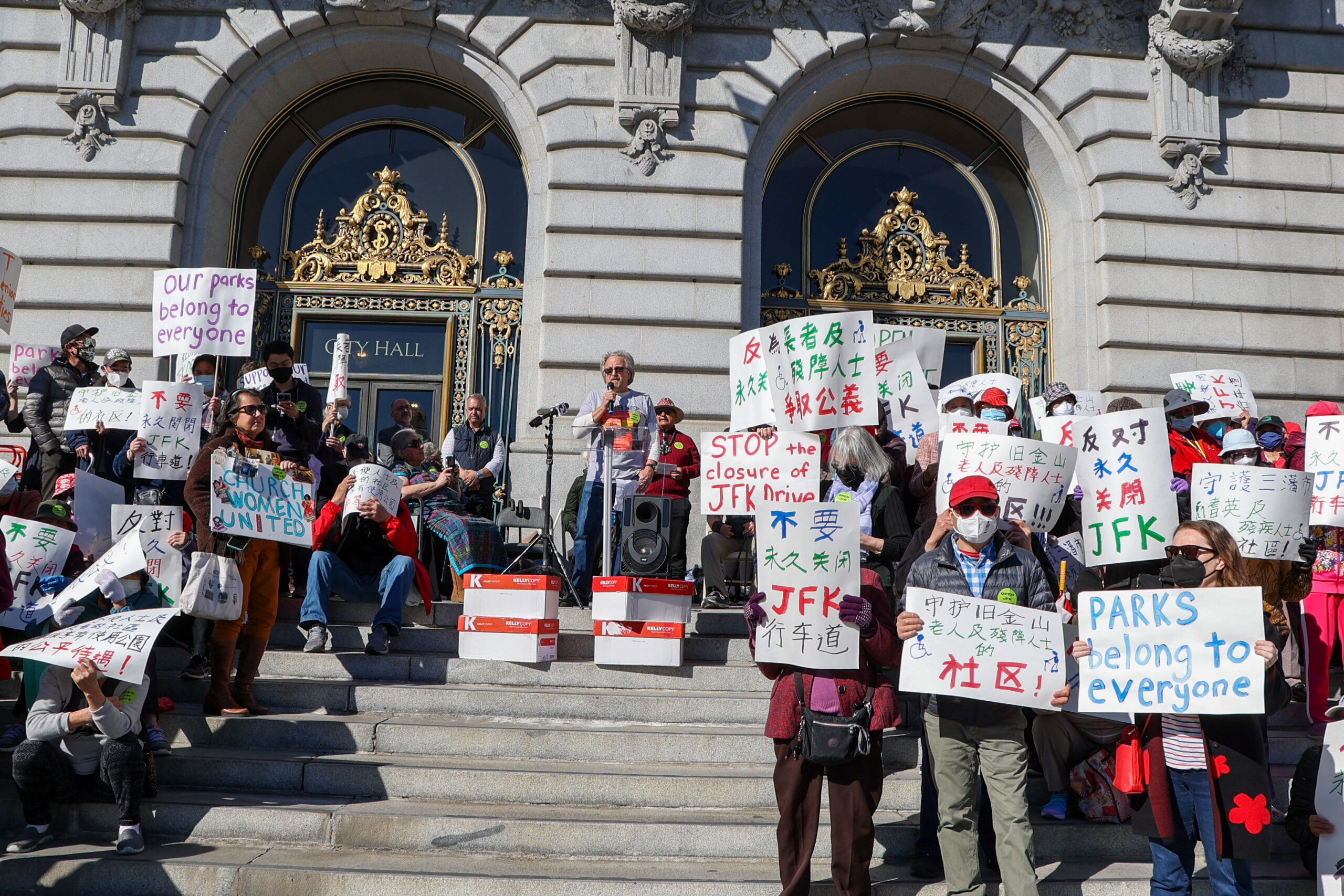Though nearly 100 protesters gathered on the steps of City Hall Thursday morning to call for the reopening of JFK Drive, the car-free avenue moved one step closer to becoming a permanent post-pandemic fixture, getting the green light from the city’s parks and transit boards.
At the first in-person meeting for the two groups in two years, both the boards of the San Francisco Municipal Transportation Agency and the city’s Recreation and Parks Department voted to recommend keeping JFK Drive car-free to the Board of Supervisors.
“We’ve been designing our cities around automobiles for 70 years now,” SFMTA Board Member Steve Heminger said. “I think it’s time to give other travel modes a turn.”
For an hour prior to the 8-hour meeting, a crowd of people rallied outside against the closures, holding signs in both English and Chinese with messages like “We drive, we vote” and “Fight for seniors.” Their protest follows several rallies in favor of car-free JFK in and around the park over the last few months that have even attracted the support of elected officials, including Mayor London Breed.
Laying out their proposal to keep JFK Drive car-free, Rec and Parks and transit agency staff highlighted 16 recommendations on top of keeping the thoroughfare closed to cars—most of which target accessibility to the park, including a new ADA parking lot behind the Music Concourse band shell and the free Golden Gate Park Shuttle that now runs every 15 to 20 minutes and connects to Muni buses.
Staff said a survey conducted during outreach found that over 70% of San Franciscans support car-free JFK Drive in Golden Gate Park, with the broadest support coming from the central and eastern parts of the city.
The departments also studied travel times from before the closure as compared to after and the rates people visit the park from across the city. They found no significant change to either.
Their recommendations are supported by organizations like Walk SF, the San Francisco Bicycle Coalition and the public policy nonprofit SPUR, along with many members of the public who spoke on Thursday.
Over more than five hours of public comment, speakers in support of continuing the closure called on the boards to prioritize bike and pedestrian safety and keep the road closed as a climate-friendly solution, lauding the departments’ recommendations to improve access to the park.
“Safety is the No. 1 reason we should be doing this,” Walk SF Executive Director Jodie Medeiros said at Thursday’s meeting.
One major point of contention is parking and access for people with disabilities. Results from the city survey found that just 39% of people with disabilities supported keeping JFK car-free, while around 60% opposed it, according to city staff who presented during the meeting. But staff said those numbers don’t capture the sentiments expressed in more than two dozen events that specifically targeted seniors and people with disabilities.
Karen Berniker, access manager at the de Young Museum who spoke in opposition to JFK’s closure, said she has struggled to do her job—which involves finding a place for people with disabilities to park—while the road has been closed. Leaders at the museum have been vocal in their opposition to the full closure.
“I just feel it’s a direct attack on the ADA law,” Berniker said.
There also appeared to be strong opposition to the park’s closure from many residents in the Chinese American community, with dozens of Chinese speakers concerned about the effect of the closure on access to the park and as a link to other neighborhoods in the city.
With the approval of the two boards, the issue is set to come before the full Board of Supervisors, who will ultimately decide the fate of the road.
But even if passed, the road closure may continue to face opposition. The group Open the Great Highway Alliance, which opposes the closures of JFK Drive and the Great Highway, has filed a lawsuit against the parks department head alleging Americans with Disability Act violations and plans to take the issue to the voters in a ballot measure if necessary.
Correction: A previous version of this story incorrectly stated that the San Francisco Council of District Merchants Association had filed claims that car-free JFK would violate the Americans with Disabilities Act. The Council has not taken a recent public position on JFK Drive. The story has been updated to reflect that advocacy group Open the Great Highway Alliance filed an ADA lawsuit against JFK Drive’s closure and may lead efforts to take the issue to the ballot.
